|
Chessville
logo by
ChessPrints
|

Chessmaze
International
"Premier Manufacturer of
Tournament Chess Products"
Largest Exporter to the USA
Offices in China & UK |
Chess
Supplies
at the
Chessville
Chess
Store!
Sets, Boards,
Clocks, Bags,
Books,
Software,
and Much
Much More!

Place Your Ad
in Chessville
or in
The Chessville
Weekly
Advertise to
thousands
of
chess
fans
for
as little
as $25.
Single insert:
$35
x4 insert:
@ $25 each.
Submit your
ad here!
Pablo's
Chess
News
Problem
of the
Week
Reference
Center
Book
Reviews
Annotated
Games
|
Headline Archives
The headlines below do not include our regular weekly features:
Each of which can be seen at it's respective archive page.
Here's what was New at Chessville
between 1 October 2004 and 31 December 2004:
| (12/26)
Annotated Game: GM Stefanova (2523)
vs GM Kosteniuk (2508) [B63],
36th Chess Olympiad Calvia (Spain) (round 7), 22.10.2004. Game
annotations by GM Alexandra Kosteniuk. See also
Kosteniuk Gets GM Title:
Alexandra Kosteniuk - model, poet, and now GM. Not WGM, but just GM!
Only the 10th women to earn the title, and the first Russian women,
Alexandra's had a very successful year, including European Champion and
a bronze medal at the Calvia Olympiad. She's now the #4 ranked women in
the world. Read about her key news for 2004, see one of her recent
games, and enter her mate-in two contest. |
|
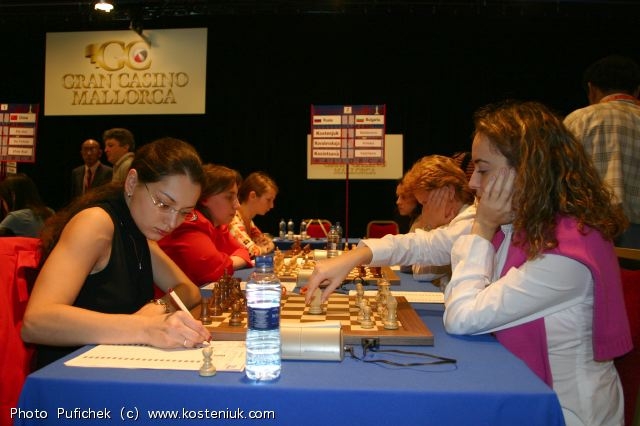 |
"Chess Grandmaster Alexandra Kosteniuk won her game against
reigning World Champion GM Antoaneta Stefanova at the Calvia Olympiads on
October 22, 2004, in the match Russia-Bulgaria,
 on the first board of the
Bronze Medal winning Russian Team. This is the second time in 2004 that
Alexandra wins against Stefanova, the first one was at the European
Championships in April. Both times Alexandra played with the black
pieces. In April Antoaneta started with 1.d4, this time she tried
1.e4..." See this
Annotated Game! on the first board of the
Bronze Medal winning Russian Team. This is the second time in 2004 that
Alexandra wins against Stefanova, the first one was at the European
Championships in April. Both times Alexandra played with the black
pieces. In April Antoaneta started with 1.d4, this time she tried
1.e4..." See this
Annotated Game! |
|
(12/26)
Rose's Rant -
Study - Whose Games?: "When I sent my previous Rant (A Study Plan)
for proof-reading Chessville's editor, Jens Madsen commented that "I never
mention studying your own games to learn from mistakes. " and asked, " Is
this intentional ? " Actually I did mention it. But in an earlier Rant (What
Makes A Strong Player Strong?)! Not in
A Study Plan which was supposed
to describe my study programme. And the answer is: yes I do
believe that studying your own games is essential to improving.
That has always been the "conventional wisdom" even though I have not
always believed it..."
|
 |
(12/24) Fiction: Mirror
Mirror, Part Four. The final installment of Scott Tortorice's story
about chess, and war, in the not-so-distant future... The story began, in
Part One, continues: "General Lenowski’s XXIII Corps was spent. Nearly out of supplies,
equipment, and men, the battle’s end was approaching. As his vision
jumped from one point of view to another, the same story was being told: the
remaining men and vehicles of his corps were clumping together in last-stand
positions. Clearly the ChiComs had the upper hand. While the
enemy’s forces were technologically inferior, they were more numerous and
were making excellent use of the terrain. With the removal of friendly
air support, the odds had swung in favor of the enemy. If the secret
weapon didn’t make its presence known in the near future, Lenowski would
have no choice but to order a withdrawal and hope they could establish a
strong defensive line before the Chinese could launch the inevitable
counterattack..."
|
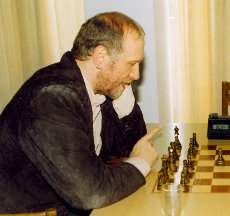
(12/22)
Breaking News: The Icelandic Committee to Free Bobby Fischer has
appealed to the Japanese Prime Minister to assist in Bobby's release.
Read the complete text of the letter.
|
Fischer Freedom
Watch
Chessville has previously reported that Iceland has
granted a Residence Permit to Bobby Fischer, although he continues to
languish in a Japanese jail. On 12-20-2004 we the following news
from the Icelandic Chess Federation's
International Affairs Liaison, Mr. Einar S. Einarsson:
US Government
expresses "surprise and disappointment" at the
permit, and asked that it be withdrawn. Iceland's Foreign
Minister, Mr. Oddsson, said "that
Iceland would stick to its invitation to Bobby
for a sanctuary in Iceland."
Read the entire report, including reaction from former World Champion
Boris Spassky, and another Fischer interview on Icelandic state radio.
|
|
(12/19)
Interview: Chessville plays
20 Questions with Tim Krabbé,
interviewed by Robert T. Tuohey. "It
was some years ago that I had first had the pleasure of discovering Tim
Krabbé ’s wonderful
Chess
Curiosities site. What a wealth of information!
Problems, studies, games, comments on current chess events ~ all
instructive and entertaining, and often provocative. Like Tim
Krabbé himself..."
|

|
|
 |
(12/19) Review: The Seven Deadly Chess Sins, by Jonathan Rowson,
reviewed by Rick Kennedy. "With
David LeMoir’s encouragement, I decided to review for “My
Chess Psychology Bookshelf” Jonathan Rowson’s The Seven Deadly Chess
Sins (Gambit 2000), a book that seems to be right up there with sliced
bread, as far as Jeremy Silman ranks things (“one
of the best chess books to come out in many, many years”);
but which seems rather crumby according to Taylor Kingston (“…at
best a flawed if earnest effort. At worst… a pretentious, barely mitigated
disaster”). Talk about being stuck between a Rook and a hard place!"
|
(12/19)
Annotated
game: Reijnerwold - Krabbé, Netherlands 1997. With annotations by Tim Krabbé,
this game is intended to accompany
Mr. Krabbé's 20
Questions interview. This was a team tournament game, played at 105
minutes for 40 moves, and 60 minutes for the rest.
(12/18) Fiction: Mirror
Mirror, Part Three. This sci-fi/chess/war story takes place in Qiqihar,
China, in 2095 AD. The story began, in
Part One, continued in
Part Two, and now continues
with the next installment: "Leng was persisting with an attack on his
queen side of the board in a desperate attempt to regain the initiative.
Slova must not allow him any chance to do so. He still had a
significant material advantage. However, against an opponent of Leng’s
caliber such an advantage could quickly disappear. Slova launched his
own attack, attempting to coordinate his pieces as best he could...The last few minutes of the battle were awesome to behold as infantry,
artillery, and armor clashed on an epic scale for control of the center of
the battlefield. This was the culmination of all his strategizing and
tactics. Victory or defeat was very close at hand. Lenowski
called up a SITREP, or situation report, on his available units. It
was a grim report, as many units no longer existed, their place in his
electronic order of battle occupied by grayed-out unit designations.
Of those that did survive many were approaching the critical mark in
supplies."
| (12/14)
Kosteniuk Gets GM Title:
Alexandra Kosteniuk - model, poet, and now GM. Not WGM, but just
GM! Only the 10th women to earn the title, and the first Russian
women, Alexandra's had a very successful year, including European
Champion and a bronze medal at the Calvia Olympiad. She's now the
#4 ranked women in the world. Read about her key news for 2004,
see one of her recent games, and enter her mate-in two contest. |
|

|
(12/12)
Aleister
Crowley…Chess Master ?!
by Robert T. Tuohey. Another
historical sketch from Robert Touhey (Klaus
Junge - Forgotten Talent). "Let’s
get one thing straight: Aleister Crowley has been called a lot of things
by a lot of people. Infamously, the scandal sheets of his day
branded him “the wickedest man in the world.”Finally,
usually somewhere near the bottom of the page, after a long and varied
list of attributes (e.g., world traveler, mountain climber, poet,
prophet, artist, womanizer, drug user, occultist, and so on), they also
toss in that he was a chess expert." |
 |
(12/12) Past Pawns:
Robert Tuohey's continuing series of sketches of the lives and chess of
interesting and often ignored chess lights of the past. "One of
the delights of chess, indeed as with all the arts, is the discovery and
exploration of the forgotten or obscure work that is, despite its anonymity,
unquestionably beautiful. And then, as you ponder the intricacies of that
gem you have just stumbled upon, don’t you find yourself wondering about the
personality, the human being, that created it? And what of the times that
person lived in?" Last month he
kicked off the column with
Klaus Junge
- Forgotten Talent, and this month he presents a fascinating look at
Aleister
Crowley…Chess Master ?!
(12/11) Fiction: Mirror
Mirror, Part Two. This sci-fi/chess/war story takes place in Qiqihar,
China, in 2095 AD. The story began, in
Part One, and now continues with
the next installment: "General Lenowski's XXIII Corps was nearly all
deployed into optimal battle formation. The enemy response, thus far, had
been timid, relying mostly on harassing fire to slow him down. An intense
artillery duel was taking place on his left flank, in and around the area of
the 4th Recon, but that was it. Lenowski guesstimated that the enemy
was holding back until they could discern the main thrust of the Russian
offensive, which was standard doctrine. It was almost time to unleash that
thrust. Lenowski keyed in the video feed from his right forward infantry
division's command armored personnel carrier. As he watched, the armored
infantry to its front was using its electro-optical camouflage and a snow
storm of increasing intensity to inch forward towards the enemy..."
(12/10) The Mad Aussie's Chess
Trivia: A fresh batch of history's little-known tidbits of chess
lore from the archives of the Mad Aussie himself, Graham Clayton.
Don't miss out on all the earlier editions either:
(12/5) Free Download: The Chessmen of Mars by Edgar Rice Burroughs.
This famous story from the pen of one of early science-fiction's all-time
great authors, is now available as a free downloadable eBook. Check it
out, along with all our other great downloads (always 100% free!)
(12/5) Site
Review: Bill Wall's Chess Page. "Bill Wall's Chess Page is
already well known to many chess aficionados. He has assembled a vast
& varied collection of chess information, all in one site. You might
want to learn more about Bill, so start with his (chess) bio.
Chessplayer, director, organizer, writer, collector, Bill has had many chess
incarnations, and still at the tender age of just 53..."
(12/4) Fiction:
Mirror Mirror, by S.D. Tortorice. "Winter, 2095 AD, Qiqihar, China.
Adrei Slova reached out and shook the hand of his opponent. He then
sat down in front of his white pieces that were aligned neatly on the chess
board. His opponent did the same in front of the black chessmen.
Both waited for the officials to start the clocks that would officially
start the game, no, Andrei corrected himself, the battle. His
opponent, Jin Leng, was very, very good. He would be no pushover..."
|
 |
(11/28) Review:
How to be Lucky In Chess by David LeMoir, reviewed by Rick
Kennedy. "How to Be Lucky in Chess is an
enjoyable book – well laid-out, readable, entertaining, enlightening, and
very practical. With the holiday gift-giving season fast approaching,
there should be a whole raft of names from your chess club on your shopping
list – each of whom could surely make good use of the book. Of course, the notion of “luck” has to be
put into proper perspective. For little kids, there are usually only
two outcomes of a game – either I won or You cheated!
Chess players are much more mature than that – the endings of their games,
especially at the club level, are due to either I won or You were
lucky! (That’s one way your club mates got on that gift list –
they don’t want to be as good as you, just as lucky.) The author explains the psychology of
How to Be Lucky in Chess..." |
|
(11/28) Review: ChessBase Magazine 99, Reviewed by Prof. Nagesh Havanur.
"Much has been made of the effortless ease with which Anand dominated
the Wijk aan Zee. But perfection eluded the Maestro from Madras in
the early rounds of the tournament. The following game is a
striking example of missed opportunity..." |

|
(11/27)
Annotated Game: Another game from the
Online Chess League's Fall 2004 Tourney,
annotated by ICCF-IM Keith Hayward (The
Road Not Taken). This week's game, from the Open Section, features
well-known author IM Jacob Aagaard essaying the black pieces.
(11/26) Symmetrical Fischer Random Chess:
by
Paul Grosemans and Austin Lockwood. "Kramnick has made an
interesting point about Fischer Random Chess (Chess Life, June 2004),
regarding the lack of aesthetic balance of random starting arrays when
compared with the familiar RNBQKBNR. Kramnick may well have a point
(and who are we to argue?)...Perhaps if it were possible to restrict the opening arrays
used in FRC to *only* those with a degree of innate symmetry and reject
those where, in Kramnick's words, "the bishop stands on h8, the knight is on
g8 and the rook on f8", it might be possible to get the best of both worlds?
With this in mind, we have developed a new game..."
|
 |
(11/21)
Review: Inside the Chess Mind by Jacob Aagaard, reviewed
by Rick Kennedy. "With 3 books authored or co-authored in 2003, and 4 titles
out in 2004 – plus three software CDs – Jacob Aagaard is not just a chess
writer these days, he’s a veritable industry. From the midst of all of
this production, Aagaard’s recent Inside the Chess Mind, appears as
if out of an old “I Love Lucy” episode, where an ever-faster conveyor belt
frazzles, and then overwhelms, the star with an endless series of sweets.
Jacob! You have some ’splainin’ to do…" |
(11/21)
Annotated Game: ICCF-IM Keith Hayward ( The
Road Not Taken) annotates games from the
Online Chess League. Today's game: jerichob (1770) - yarlan (1135)
[C78] ICS rated standard match freechess.org 2004 Fall OCL Tournament (1),
30.10.2004. Keith has help from the victor annotating this game - most
annotations are from Jericho Barimen (Jerichob).
(11/21)
Historical
Portrait: Klaus Junge - Forgotten Talent, by Robert T. Tuohey.
A biographical sketch and three early games analyzed, along with a free
downloadable pgn database of all 112 known Junge games. "Chess,
like any high cultural activity, will suffer during periods of social
upheaval. Human persistence and imagination being what they are,
however, true artistic talent has a way of shining even in the worst of
circumstances. Such is the case of the German chess player Klaus
Junge (1924 – 1945)."
|

|
|
 |
(11/19)
Review: ChessBase Magazine 98, reviewed by Prof. Nagesh Havanur. "The
patzer is the underdog of the chess world. Confronted with champions of
the game he is easily awed and crushed over the board. Alexander Huzman,
an experienced GM from Israel, is no patzer. Yet when he sat down
to play Garry Kasparov at the last European Club Championship, the
result appeared to be a foregone conclusion. Fortunately for him, Caissa
intervened and the tide turned….." |
| (11/14)
Interview:
Chessville plays
20 Questions with
Taylor Kingston. For the past several years, Kingston has
been a frequent contributor to chess literature - as a reviewer,
reporter, analyst, author of historical articles, and book editor.
His book credits include Heroic Tales: The Best of ChessCafe.com
1996-2001, which he edited and co-wrote, and The Life and Games
of Carlos Torre by Gabriel Velasco, which he translated from
Spanish. An avid student of chess history, his historical articles
have appeared in Chess Life, Inside Chess, Kingpin,
and Chess Horizons, and his many book reviews at
Chess Cafe
have earned him a reputation for both fairness and stern candor. |
 |
|
 |
(11/14)
Review: The Scandinavian Defence by James Plaskett, reviewed by
Darren Radford. "The Scandinavian Defence, also
known in a previous life as the Centre Counter, was the first and only
defence to 1.e4 I have ever played, so I ordered this book sight unseen when
I spotted it on Amazon.
When
I started playing the Scandinavian, recommended by Eric Schiller in his
Gambit Opening Repertoire for Black, it was
considered somewhat marginal and unknown, and the literature that
accompanied the opening was sparse.
Its popularity has increased over recent
years, and this book by British GM James Plaskett is the latest treatise on
the Scandinavian.
I can find no evidence of the author actually playing this
opening, however, so this book is written with a critical, outsiders view..." |
| (11/14)
Annotated Games: ICCF-IM Keith Hayward ( The
Road Not Taken) annotates games from the
Online Chess League. The Online Chess League was founded for
players who prefer slow time controls and healthy competition, as well
as the chance to meet many great people. Check it out, and enjoy
these instructive annotations by five-time OCL Open Section Champion
team-member Keith Hayward.
Today's
game: Chessface (1617) - petlya (1608) [A21] FICS rated standard
game, 2004 Fall OCL Tournament (1), 29.10.2004 |

|
|

|
(11/12)
Review:
Practical Chess Psychology: Understanding the Human Factor by
Amatzia Avni, reviewed
by Rick Kennedy. "Avni’s
Practical Chess Psychology reminds me a lot of my “Introduction to
Psychology” textbook of years gone by -- introducing, discussing and
explaining many topics competently, without the kind of mind-numbing detail
that would send the reader running for a straight jacket. It is
broader, but more general, in its coverage than the author’s later book,
The Grandmaster's Mind;
which, to continue the analogy, would be akin to Avni’s master’s thesis. It is no
surprise that Avni moves through his subject easily and knowledgeably.
He is a psychologist as well as an FIDE master..."
|
| (11/8) Jude Acers On
Tour: The Louisiana Legend's world tour rolls on, this time
from Lusher Elementary School in New Orleans Louisiana.
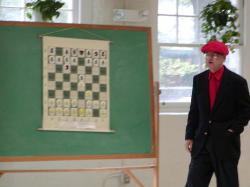 |
 |
|
 |
(11/7)
Review: Chess: The Art of Logical Thinking by Neil
McDonald, reviewed by Rick Kennedy. "Neil McDonald, an International
Grandmaster and chess trainer, knows the ironic, cold reality that every
chessplayer faces, from novice to champion:
When you sit down to play a game of
chess you are in command of exactly the same eight pieces and eight pawns
that Capablanca, Fischer and Kasparov have used to create masterpieces of
grand strategy and tactical precision. Their pieces didn’t have
heightened powers nor more fertile soil on which to work their stratagems:
just the same 64 squares, 32 white and 32 black.
Then he twists the knife a bit, while
stating what we all know, only too well..."
|
(11/7) Fiction:
Botkin’s Resignation, by Robert T. Tuohey. "Taxis in major
cities have but two speeds: purblind, and the sluggish crawl. The
norm, naturally enough, is spurts of the former interspersed with leaden
periods of the latter. Certainly the case under present consideration, a
N.Y. city taxi whiz-creeping its way from La Guardia to the King’s Men
Hotel, Manhattan, was no exception. The occupants were two..."
|
 |
Happy 4th Birthday
Chess Today!! |
| (11/6) Today marks the 4th anniversary of
Alexander Baburin's fantastic daily chess newsletter, Chess Today.
Check out our review,
and look over several sample issues, including their
4th Anniversary
Issue! Chess Today arrives in your
email inbox bearing three files: the
first is a PDF file containing the newsletter itself. The
other two files are PGN and Chessbase (cbv) formats of the games and
annotations contained in the newsletter itself, along with a small
assortment of additional games selected for their topicality and
relevance. More sample issues are available at the Chess Today
site's
sample page. |
 Each issue of
Chess Today ranges from three
to five pages in length and contains a puzzle, news reports from major chess
tournaments and matches, and annotated GM/IM games from those events.
Occasional OpEd pieces discuss chess politics and other current chess
events.
Some issues contain instructional materials, book review, interviews and
cartoons.
Chess Today is simply the best chess daily available!! Each issue of
Chess Today ranges from three
to five pages in length and contains a puzzle, news reports from major chess
tournaments and matches, and annotated GM/IM games from those events.
Occasional OpEd pieces discuss chess politics and other current chess
events.
Some issues contain instructional materials, book review, interviews and
cartoons.
Chess Today is simply the best chess daily available!!
|
|

|
(10/31)
Review:
The Discart – Bonetti Chess Match, 1863 by Alessandro Nizzola, eBook
Published by ChessCentral, reviewed
by Rick Kennedy. "Return with us now to those thrilling days of
yester-year…Not to the Lone Ranger and Tonto, mind you, but to two
mid-19th century Modenese chess swash-bucklers, Francesco
Discart and Cornelio Bonetti; and not through the medium of old-time
radio, for that matter, but through the new format of the chess eBook...Discart
was one of the strongest players in Modena in the mid-1800s..."
|
(10/30) New Links:
We've added more than 40 new chess sites for your education & entertainment!
Everything from playing sites to chess engines, from shopping sites to
training sites, from scholastics to Champions, there's something for
everyone. We even added a brand new category of links -
Chess
Variants.
(10/27) OPEN
LETTER sent by E-mail to all delegates to the FIDE-Congress: The
Action Committee for a Democratic FIDE
presents new information about the political wranglings at Calvia: "As
an independent Think-Tank without an agenda of our own, we like to alert you
to a few extremely worrying points relating to the official agenda. We want
you to be armed with the right questions, so that a vigorous discussion can
be held in the committee meetings in the coming three days. And that the
right reports are submitted to the General Assembly for the final three
days..."
|
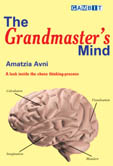
|
(10/24) Review:
The Grandmaster's Mind by Amatzia Avni, reviewed by
Rick Kennedy. "In The Grandmaster’s Mind Avni
presents an enlightening – and very enjoyable – look at how top chess
players think. He gathers his information the old fashioned way: he asks the
grandmasters, themselves. Early in the book, the author shows why it
is good to understand not just chess thinking, but chess thinking
by its best practitioners..."
|
|
(10/22)
Tactical Artwork:
Gothic Chess creator Ed Trice takes us on a fanciful flight of tactical
imagination on the canvas of the Gothic Chessboard. "While the
masterpieces of Michelangelo ... are known to us from his fantastic
labors, as we replay the "renaissance equivalents" through the chess
games of Morphy, Tal, and Fischer, we see creativity of a completely
different form. The attacks constructed by these chess renaissance
geniuses seem to rain down as though without effort, as if they were
"meant to be". While it takes a Morphy or a Tal or a Fischer to
carve such beauty out of the stone of chess, in
Gothic Chess,
the slab is of a softer substrate, yet the finished product is equally
outstanding. Even newcomers to the game can produce what I call
"tactical artwork"; those outstanding combinations that seem to come
from out of nowhere." |
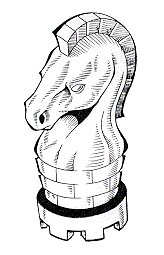 |
|
(10/17) Chess Position
Trainer: Stefan Renzewitz writes about his creation, "Chess Position Trainer (CPT)
is a repertoire-management software which has been developed by a chess
player for his own purposes: A tool to organize all of
his chess material in a more efficient way (as
current software like Bookup, Chess Assistant or Chessbase allowed him to do)
and at the same time offer features to study it much more efficiently
than ever before. With chess material we are talking about
chess books, CD’s and databases. They all
play an important role in improving someone’s chess skill and CPT doesn’t
aim to replace them. Just the
opposite is true. CPT will help you to get
even more out of them, and in a more efficient way."

|
|
 |
(10/15)
Review: Birth of the Chess Queen:
A History by Marilyn Yalom, reviewed
by Rick Kennedy. "Years ago, I worked through an impressive collection of
Akiba Rubinstein’s chess games, and facetiously decided I could summarize
the Polish grandmaster’s winning style this way: a) open with 1.d4; b) reach
a Rook and Pawn endgame; and c) win the endgame. In like manner, I can
summarize Yalom’s Birth of the Chess Queen: a) the game of chess we play
today has evolved from an earlier game with different rules and pieces; b)
over time, the eleventh through fifteenth centuries, the Vizier, or advisor
to the King, was replaced in Europe by the Queen, which then further morphed
from the weakest piece on the board to the strongest one; and c) the
transformation of the chess Queen paralleled the rise of various powerful
real-life queens. I recommend Rubinstein to all chess players; Yalom, to a
select few." |
| (10/14)
Going for the Gold:
The 2004 U.S. Women’s National
Team is heading to the 36th World Chess Olympiad in Calvia, Spain next
week hoping to capture its first ever women’s Olympiad medal.
Will they bring home the gold?
Join Susan, Irina, Anna, and Jennifer as they...
Go for the Gold! |
 |
(10/13)
The Online Chess League Presents:
The Fall 2004 Tournament
Looking for some serious team
competition? The OCL's Fall 2004 Tourney closes Saturday Oct 23, 2004.
Sign
Up Now!! Check out this great way to make new
friends while getting in some serious standard time control chess!
Sign Up Here
For the Fall 2004 OCL Team Tourney!!
|
 |
(10/10)
Review:
Chess Psychology by Angus Dunnington, reviewed by Rick Kennedy.
"When players talk about chess psychology, they usually mean either a) using
knowledge about mental processes to improve (or add) good habits, and get
rid of bad habits; or b) using different ploys, ruses or strategies to
unsettle or in some way get an advantage over an opponent. Thus, we have
seen books from Thought and Choice in Chess to How to Cheat at Chess, with a
whole lot of titles in between.
Inevitably, someone will mention Bobby Fischer’s quote, now laden with
rusted irony: "I believe in good moves." As someone who
“believes in psychology” (it’s kind of like my “day job”) and who is a
chess psych junkie with
a stack of books on the subject,
I grabbed Dunnington’s Chess Psychology as soon as I could..."
|
(10/9)
My Chess Psychology
Book Shelf: Rick Kennedy takes you on a whirlwind tour of his
books dealing with or related to the psychology of the chess player.
Included in this series of mini-reviews are such classics as Thought
and Choice in Chess, Adriaan de Groot (1965); Psychology of
the Chess Player, Reuben Fine (1967); Psychology in Chess,
Nikolai Krogius (1976); and Think Like a Grandmaster,
Alexander Kotov (1971); along with a bevy of lesser known and more modern
titles, including The Chess Mind, Gerald Abrahams (1951);
Catalog of Chess Mistakes, Andrew Soltis (1979); How to
Think in Chess, Jan Przewoznik and Mark Soszynski (2001); and many
others.
(10/9)
Review: Rick
Kennedy reviewed Chess Psych Tapes back in 1985, and we reprint that
review today as an accompaniment to his article
My Chess Psychology
Book Shelf.
(10/9)
Review:
The Psychology of Chess Skill, by Dennis H. Holding, another
reprinted review of Rick Kennedy's intended as an accompaniment to his
article
My Chess Psychology
Book Shelf.
(10/4)
Final Report
About FIDE Reform: Kaarlo Schepel, spokesperson for the
Action Committee for a Democratic FIDE,
presents a synopsis of ideas and proposals for reforming FIDE. "We
intend to call a spade a spade. And we remind everyone that in
times of crisis it does not pay to be silent...In
re-orientating Fide to the future of world chess, it is necessary we submit,
to establish modern professional competencies in the six departments, so
that future matters of chess development and chess management can be
addressed by people well qualified to do so..."
|
 |
(10/3)
Review:
Starting Out: The English by Neil McDonald, reviewed
by Rick Kennedy. "As a life-long 1.e4 player and frequent
1.d4 player (although I always considered the Blackmar Diemer Gambit to be
kind of an e4 opening) I figured if Neil McDonald could make the English
Opening, 1.c4, make sense to me -- better yet, make it attractive -- that
would be enough for me to recommend it highly. Make no mistake: I
recommend it highly..." |
(10/3)
A Study Plan:
Tom Rose is back with another of
Roses Rants, this time
laying out his study plan in great detail. "You can't make yourself any younger. You can't go back
to before your birth and get a different set of genes or a better start.
But what you can do starting now is to work hard, and try to do the right
things. How hard am I working? What am I actually doing with my
time? I have already explained my choice of study materials (Chess
Books). Now I'll show you how I have organised my study plan, and
why..."
(10/2)
Mad Aussie's Chess Trivia:
A fresh batch of the weird and wonderful, from the archives of the Mad
Aussie himself, Graham Clayton. Today's collection includes four of
Graham's popular Who Am I? feature, along with tidbits about Fischer,
Troitzky, Steinitz & Zukertort, the Turk, and lots more. Enjoy more of
The Mad Aussie's Chess Trivia in the archives, starting with
Part One.
Chessville Headline Archives:
June-September 2004 |
search tips
The Chessville
Weekly
The Best Chess
Newsletter
On the Planet!

Subscribe
Today!!
The
Chessville
Weekly
Archives
Discussion
Forum
Chess Links
Chess Rules
Chess Wisdom
|
























 Each issue of
Each issue of











